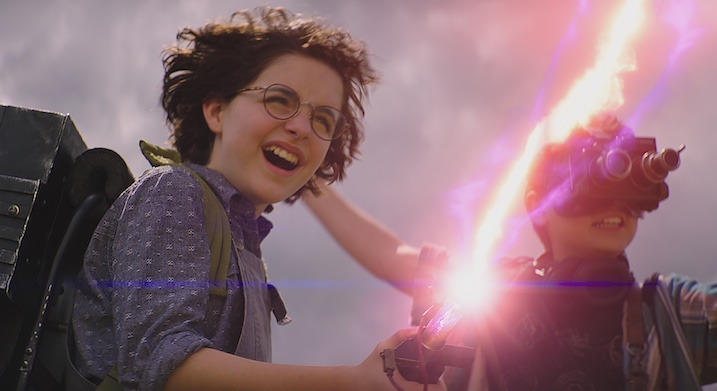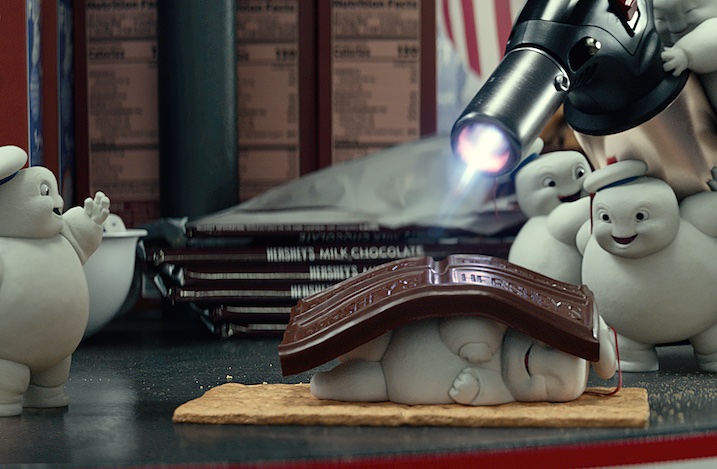‘Ghostbusters: Afterlife’ Ain’t Afraid Of No Jokes (Movie Review)
 After several delays due to COVID, Sony Pictures is finally releasing director Jason Reitman’s direct follow-up to the Ghostbusters movies from the Reagan era, Ghostbusters: Afterlife. OG ghostbuster Dan Aykroyd had supposedly tried to resurrect the beloved series for decades but could never get a script into an acceptable state for the other cast members, most notably Bill Murray. In 2016, director Paul Feig (Bridesmaids) released an all-female remake to theaters. The film was a box office disappointment made worse by fanboys who can be less than gracious towards women trying to play with their toys. For the record, I enjoyed the Kristen Wiig/Melissa McCarthy-led feature as much as the 1984 original. So here we are in 2021 with Ivan Reitman’s Oscar-nominated son, Jason Reitman, attempting to deliver more magic than jokes in a franchise that has had a tough time being relevant in the 21st century. Is this another nostalgia-focused attempt? More of what certain middle-aged dudes have been clamoring for? Not at first, and then, sure.
After several delays due to COVID, Sony Pictures is finally releasing director Jason Reitman’s direct follow-up to the Ghostbusters movies from the Reagan era, Ghostbusters: Afterlife. OG ghostbuster Dan Aykroyd had supposedly tried to resurrect the beloved series for decades but could never get a script into an acceptable state for the other cast members, most notably Bill Murray. In 2016, director Paul Feig (Bridesmaids) released an all-female remake to theaters. The film was a box office disappointment made worse by fanboys who can be less than gracious towards women trying to play with their toys. For the record, I enjoyed the Kristen Wiig/Melissa McCarthy-led feature as much as the 1984 original. So here we are in 2021 with Ivan Reitman’s Oscar-nominated son, Jason Reitman, attempting to deliver more magic than jokes in a franchise that has had a tough time being relevant in the 21st century. Is this another nostalgia-focused attempt? More of what certain middle-aged dudes have been clamoring for? Not at first, and then, sure.

The film is set in a small Oklahoma town after the recent death of Egon Spengler (the late Harold Ramis), resulting in his estranged daughter Callie (Carrie Coon) and her two kids moving there to live on the now-abandoned “dirt” farm. Granddaughter Phoebe (McKenna Grace), a nerdy preteen, is front and center this time alongside her pal ‘Podcast’ (Logan Kim) and her big bro Trevor (Stranger Things’ Finn Wolfhard), which gives Afterlife a Ghostbusters: Stranger Things Edition feel. Just as long as they remember not to cross the streams, right?
By far, the best aspect of this new installment is how Reitman and co-writer Gil Kenan have cherry-picked from several sources instead of just the 80s original. In tone, Ghostubers: Afterlife feels like Robert Zemeckis’ Back to the Future accompanied by a score reminiscent of Alan Silvestri, with Phoebe investigating the town’s past as well as her grandad. In setting, a lone road with a mystical mountain evokes Steven Spielberg’s Close Encounters of the Third Kind. A proton pack is instilled with the same nostalgic vibes as a lightsaber in J.J. Abrams’s Star Wars: The Force Awakens. The casting and dialogue are tuned to the aforementioned Duffer Brothers’ hit Netflix series, Stranger Things.
With so many inspirations coming from other sources, there’s not much left for Jason to ape his father’s biggest hit. That’s a good thing, though, because, let’s be honest, there’s not much to Ghostbusters beyond the one-liners we all remember. Still, in terms of lore, Reitman and his crew struggle to graft on any kind of significant weight.
This is a losing proposition as the original’s strengths were never about supernatural gatekeepers or key masters. Ivan Reitman’s gift as a filmmaker was to take SNL’s “not ready for primetime” ensemble and pit them against authoritarian figures who were ripe for mocking, like the industrial-military complex in Stripes, his best film. Conversely, in 2021, it’s unfortunate how poorly the Reagan era’s capitalist aspirations by way of Peter Venkman come across today compared to the lone environmentalist who was unfairly made into the plot’s villain for no good reason. Beyond the admittedly many quotable lines are less great stuff like the lazily named Slimer. The hot dog gobbling ghost was easy for selling lunchboxes (because Reagan era) but lacked any semblance of a personality. Which begs the question: what exactly is Ghostbusters legacy?

For most of us, it’s the jokes and the cast’s personality that have survived nearly forty years later. It was never ever about how some goofballs were gonna save the world from ghosts and demons (Why do you think Ray Parker’s hit song was used in such a lengthy montage of zero-stakes scenes?). Look, I lived through the 80s. I can recite the ’84 film pretty well. And I can’t imagine a worse idea for a Ghostbusters movie than leaning into the supposed mythology of its world. This ain’t Star Wars.
Over the course of Ghostubers: Afterlife’s two hours, Carrie Coon and Paul Rudd’s science teacher character attempt to breathe life into such a venture, but there’s only so much these capable actors can accomplish. Make no mistake, on the kids’ side, Grace, Wolfhard, and a scene-stealing Kim are doing their best to elevate the material. But ultimately, it’s the exact same plot as the other installments with little to no new revelations about the titular afterlife. To be fair, adding modern, likable characters and then dumping them into the same last act shenanigans is pretty much Starkiller Base in The Force Awakens, yet I was a fan of that film. Which is to say, depending on your love for this series, your mileage may vary.
There are some good spots I really enjoyed. A brief scene involving a ghost that can eat prison bars to the delight of Podcast is cute. I also really hope Kim gets more work. Most notably, Grace is terrific as a kind of Sheldon Cooper type a la The Big Bang Theory (coincidentally, she plays opposite Ian Armitage on CBS’s hit spin-off Young Sheldon).

Her scenes with Coon have a lived-in mother-daughter dynamic. Is any of this the kind of thing you’d expect to see in a Ghobusters movie? No, but they are the kind of human moments Reitman has excelled at in his best features: Juno and Up in the Air. Ditto his sister, Catherine Reitman, with her hit Canadian sitcom, Workin’ Moms. Clearly, this talented family knows how to mine good scenes from characters just talking to each other.
Still, too much of the world-building and nostalgia ultimately sinks the nicer, more grounded vibe. CGI spectacles like when Rudd goes from “awe” to “yikes!” as a tiny bag of animated Stay Puft Marshmallow meanies dubbed the “mini-Puffs” wreak havoc at a Walmart lands with a thud. True, this isn’t purely a comedy, so not being consistently funny (by design) is fine, but Ghostbusters: Afterlife isn’t at all spooky or tense either.
Eventually, Reitman’s talent for human connection gets lost in a franchise flick that lacks a real sense of identity. This is why the big climax piles on the nostalgia up to eleven. Is this what the fans wanted all along? Probably, but it sure felt pointless.
![]()
![]()





















